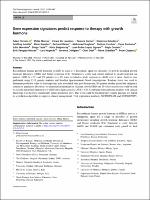Resum
Paraules clau
Xarxes reguladores de gens; Marcadors predictius
Citació recomanada
Stevens A, Murray P, De Leonibus C, Garner T, Koledova E, Ambler G, et al. Gene expression signatures predict response to therapy with growth hormone. Pharmacogenomics J. 2021 Oct;21:594–607.
Audiència
Professionals
Empreu aquest identificador per citar i/o enllaçar aquest document
https://hdl.handle.net/11351/7065Aquest element apareix a les col·leccions següents
- HVH - Articles científics [2970]
Els següents fitxers sobre la llicència estan associats a aquest element:

